Three years after Corbyn’s defeat, UK’s Labour fights to purge lurking antisemitism
Party leader Keir Starmer is serious about eradicating bigotry – but after the previous head’s tenure, the well of public opinion about Jews may have already been poisoned
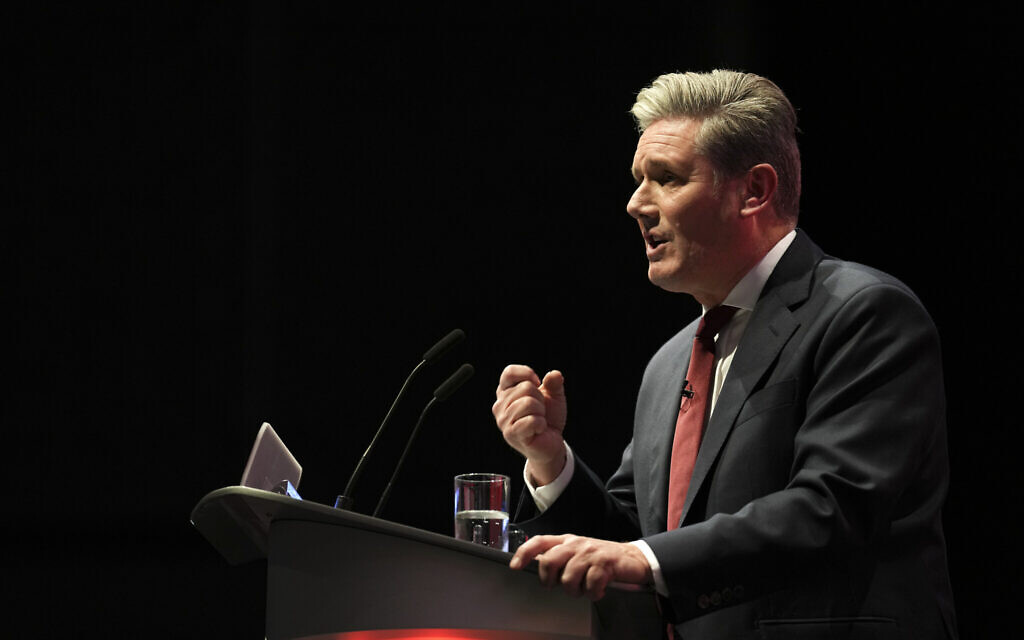
LONDON — Three years ago today, Jeremy Corbyn, the far-left leader of Britain’s Labour party, suffered a devastating defeat in the country’s general election.
With his leadership dogged by allegations of antisemitism, the Jewish community had viewed the prospect of a Corbyn premiership with fear and trepidation.
Today, Labour’s political prospects have been transformed. Under Keir Starmer, a moderate who has dragged the party back to the center ground, it holds a steady, 20-point lead in the polls.
Likewise, relations with the Jewish community are being painstakingly rebuilt — even if some fear that the ghost of Corbynism has not yet been fully laid to rest.
“The Labour Party under Starmer’s leadership is a different one from that under his predecessor,” says Claudia Mendoza, co-chief executive of the Jewish Leadership Council. “From day one, he has acted in good faith and with actions to match his words. He has been unequivocal in his stance against antisemitism because he knows that for the party to be taken seriously again, it needed this issue to be dealt with.”
But, reflecting the sense that Starmer’s task isn’t yet complete, Mendoza adds: “There is still work to do, especially with respect to rebuilding the relationship with the community. There does now seem to be an understanding that anti-Zionism often strays into antisemitism on the left and there is still work needed to deal with this.”
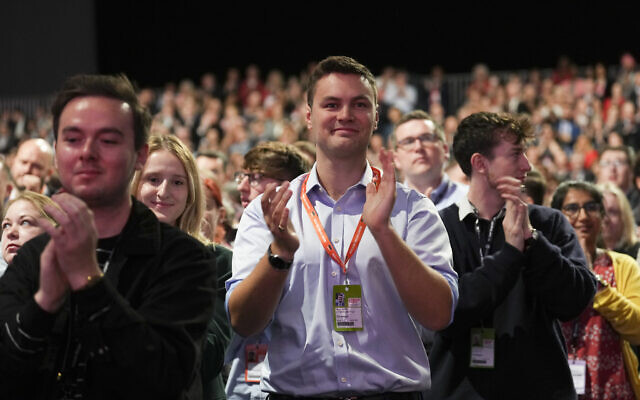
Similarly, another of the Jewish communal groups that were at the forefront of the campaign against antisemitism in the party, the Board of Deputies of British Jews, welcomes Labour’s progress under Starmer but sounds a note of caution.
“Since his election as leader, Sir Keir Starmer has made good progress on addressing Labour’s antisemitism problem,” says Board president Marie van der Zyl. “I am happy that the Board of Deputies has been included on Labour’s advisory board and Sir Keir is certainly committed to changing the party’s culture. However, the left’s obsession with Jews and Israel is still a problem and we regularly see hateful comments online. Time will tell whether his work is sufficient to rid the party of this awful racism.”
No moment perhaps more clearly symbolized the transformation Starmer has unleashed within the party than when delegates at Labour’s annual conference in September rose to give their leader a spontaneous standing ovation as he described his efforts to “rip antisemitism out by its roots.”
“The cancer of antisemitism in Labour has become symbolic of its unreadiness to govern. Was this the moment the party won the next election?” asked the Jewish Chronicle’s political editor in his account of the conference.
That question underlines the fact that concern about antisemitism within its ranks extended far beyond Britain’s Jewish community and is widely credited with having contributed to Labour’s worst loss since 1935.
The ovation which greeted Starmer’s words in September — which stood in sharp contrast to the atmosphere at the 2019 conference where delegates chanted “Free Palestine,” waved Palestinian flags and near-unanimously passed a strongly anti-Israel policy plank — was hailed by top party moderates as a turning point.

For Starmer, the issue is personal as well as political: His wife is from a Jewish background and the couple has extended family living in Tel Aviv.
Cracking — and withdrawing — the whip
The Labour leader, who served in Corbyn’s Shadow Cabinet, began his effort to detoxify the party on the day he took the helm in April 2020. His first act was to issue an apology to Britain’s Jews. Within three days, he was meeting with Jewish communal organizations. Two months later, he fired prominent left-winger Rebecca Long-Bailey from the Shadow Cabinet after she shared an article on social media which contained an antisemitic conspiracy theory.
But the early months of his leadership were also a time of treading water as the party awaited the findings of an investigation into antisemitism by Britain’s equalities watchdog launched while Corbyn was still in office. When it came in November 2020, the verdict from the Equality and Human Rights Commission (EHRC) was predictably brutal.
Less predictable, however, was Starmer’s reaction when Corbyn responded to the EHRC’s findings by claiming that the scale of the problem had been “dramatically overstated for political reasons.” The former Labour leader had the whip withdrawn, removing him from the parliamentary party and forcing him to sit in the House of Commons as an independent. Starmer’s decision was “unprecedented but totally deserved,” says one Jewish community source. “In less than 12 months, Corbyn went from Labour’s candidate for prime minister to no longer a Labour MP.”
Starmer recently confirmed that he did not “see the circumstances” in which Corbyn, having refused to apologize and withdraw his remarks, would stand as a Labour candidate.

That determination is applauded by Dave Rich, director of policy at the Community Security Trust, which monitors antisemitism and provides protection for Jewish venues.
“There is still a great deal of mistrust of Labour in the Jewish community, and the party needs to find more ways to convince the community that there is no going back to the dark days of Corbyn’s time. Kicking him out of the party for good would help,” says Rich.
On a more prosaic level, Labour has moved swiftly to implement a series of changes demanded by the EHRC to reform its disciplinary processes and provide the independent oversight which Jewish community groups had repeatedly called for.
A huge backlog of antisemitism cases, which had built up during Corbyn’s time at the top, has now been cleared. As part of the clear-out, high-profile heads have rolled. The party has also provided antisemitism training, designed by the Jewish Labour Movement (JLM), to parliamentarians, local councillors and office-holders, and grassroots members.
But as spelled out by Luke Akehurst, a member of Labour’s ruling National Executive Committee and director of a pro-Israel campaign organization, Starmer’s reforms have gone beyond “the basics of what was required by the EHRC.” The party has banned seven hard-left groups from its ranks, five of which either claimed that the problem of antisemitism had been exaggerated or suggested that it had been manufactured as part of an Israeli-organized smear campaign.
While several hundred party members have been expelled — either directly over accusations of antisemitism or because they belonged to one of the proscribed groups — there has also been a huge churn in Labour’s membership. As the party has shifted to the center under Starmer and toughened up on antisemitism, tens of thousands of members who joined to support Corbyn have left. At the same time, the party has also seen new recruits join, including many who quit on Corbyn’s watch.
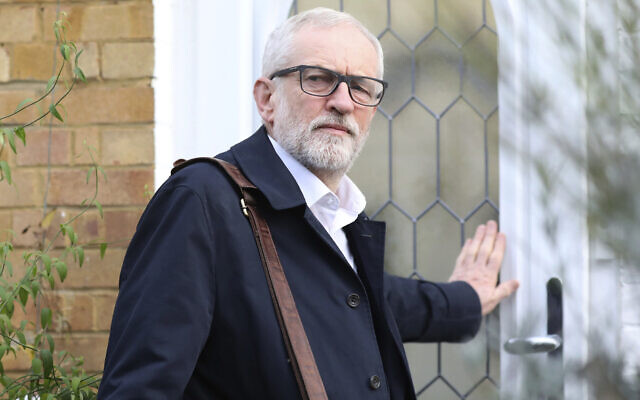
Overall, estimates Akehurst, over 40 percent of Labour’s pre-2020 membership has now left the party. “These are likely to be disproportionately those members with the most extreme views as they are least likely to be reconcilable to the party’s change of direction,” he wrote in a recent analysis. “This in turn has changed the political control of and atmosphere in most [local parties], making them a more welcoming place for Jewish members.”
However, as Rich says, “processes and policies only get you so far: much more significant is the change in political culture. Under Corbyn, being part of the antisemitic hard left was a route to political advancement in the party. Under Starmer, it is a quick way to get frozen out completely.”
Indeed, he says, “the story of the rise and fall of rampant antisemitism in the Labour Party is an object lesson in the importance of leadership in setting the tone of an organisation.”
“Members have quickly learned that there is no political benefit, and huge risk, to expressing open antisemitism in the party,” Rich says. “This does not mean that there are no antisemites left in Labour — many are still there, despite the large number of expulsions and others who have left of their own accord. But they can tell which way the wind now blows.” This, he believes, is “more important than all the formal changes that have occurred.”

Shadowy role in Corbyn cabinet
Other leading figures in the Jewish community, however, find Starmer’s willingness to serve in Corbyn’s Shadow Cabinet difficult to forgive.
Stephen Pollard, who edited the Jewish Chronicle throughout Corbyn’s leadership, believes Starmer is “sincere, committed and relatively successful so far.”
“I think realistically there’s not much more that the Jewish community could have asked for from him in terms of demonstrating his commitment to dealing with antisemitism,” he says.
But Pollard terms Starmer’s decision to accept the post of Shadow Brexit Secretary under Corbyn “a character stain.”
“I think the problem is something he can’t [now] do anything about which is his behavior before 2019 — the fact that, unlike [some] others, he took on not just a minor frontbench role but an absolutely pivotal frontbench role,” he says, adding, “I find it really difficult to put a man in power who put his career above everything else when Corbyn was leader.”
Nonetheless, thanks to Starmer’s changes, Jewish members and supporters
are beginning to return to Labour and there’s some evidence the party is getting a hearing from the wider community again.

Last year, Louise Ellman, a veteran Jewish Labour MP and former chair of Labour Friends of Israel (LFI) who quit the party in disgust at Corbyn’s leadership, announced she had rejoined. Her decision was politically important for Starmer: He had repeatedly said that a key test of his efforts to rid the party of Jew-hatred was whether Ellman would feel ready to return.
Starmer has also used one of his handful of appointments to the House of Lords to send Ruth Smeeth, another former Labour MP who was the victim of a wave of antisemitic abuse, to parliament’s upper chamber.
The party, which has begun the process of selecting its candidates for the next general election, has already chosen two Jewish would-be MPs for key north London constituencies. Hendon and Finchley and Golders Green are not only high on the party’s target list, but have a significant Jewish vote. In what Labour hopes is a harbinger of future success, the party swept to power in May’s local authority elections in the London borough of Barnet, which has the UK’s largest Jewish population.
No room for complacency
Sarah Sackman, who was selected last month as Labour’s candidate in the Finchley seat once represented by Margaret Thatcher, says the Barnet result is evidence of the fact that “the Jewish community, like the wider public, is prepared to listen” to the party in a way that it wasn’t three years ago.
“The mood has shifted and the image of the Labour Party has undergone a seismic change in the last couple of years under Keir Starmer’s leadership,” says Sackman, an environmental barrister and vice-chair of JLM.
While stressing that Jewish voters are by no means monolithic, in the early stages of her campaign Sackman says she’s already picking up “an openness and engagement that I don’t believe was there a couple of years ago for good reason.”

Jewish voters are approaching her to share their “disquiet and upset” about Brexit, the economy, housing and the NHS, without the subject of antisemitism coming up, she says.
“People within the community [are] ready to have a different sort of conversation about politics and the sort of conversation… that [does] not involve their identity or a perceived threat to their identity,” believes Sackman.
She praises the manner in which Starmer made tackling antisemitism in the party a “political priority” but argues that “there’s no room for complacency.” Within the Labour party, Sackman suggests, there was a “need for a culture change and a change around the conversation around Jewish people, antisemitism, [and] how we discuss the Middle East.” She adds: “These are not things you can change overnight and it is right and proper that the Jewish community and institutions… hold and continue to hold the Labour Party to account.”
Starmer has also begun to shift Labour away from the virulent hostility to Israel which characterized the Corbyn years. Moderates in the party have long argued that the party’s attitude towards the Jewish state and conflict with the Palestinians represents a litmus test of the credibility of its overall foreign policy and its fitness to govern.
Michael Rubin, director of LFI, says the Labour leader has set about “restoring the Labour Party’s long and proud tradition of support for the Jewish state.”
“There is still more work to be done to fully repair the damage inflicted under Jeremy Corbyn, but it is clear that Keir is committed to building a strong bilateral relationship between the UK and Israel, fighting the poison of antisemitism and resolutely opposed to the BDS movement,” he says.
The new tone was demonstrated in the warm speech Starmer gave to LFI’s annual lunch last year in which he attacked anti-Zionist antisemitism as the “antithesis of the Labour tradition” and criticized the “obsessive focus on the world’s sole Jewish state.” Pledging to “emulate and enhance” the record of the last Labour government — which adopted a markedly pro-Israel stance under former prime ministers Tony Blair and Gordon Brown — Starmer said his party would be “clear-sighted about the nature and ambition of the likes of Hamas and Hezbollah,” oppose the Boycott, Divestments and Sanctions (BDS) movement, and work to strengthen bilateral ties between the UK and the Jewish state.
Starmer’s approach was echoed by his shadow chancellor, Rachel Reeves, when she addressed LFI last month. Reeves, a vice-chair of LFI who refused to serve on the frontbench under Corbyn, also adopted a tough line towards the Iranian regime, saying it “must be held to account for its aggressive actions at home and abroad.” Reeves’ words reflect the harder attitude towards the Islamic Republic advocated by shadow foreign secretary, David Lammy. Lammy’s willingness to call out Tehran marks another sharp break from the Corbyn leadership, which came under fire for its allegedly weak stance towards the regime.
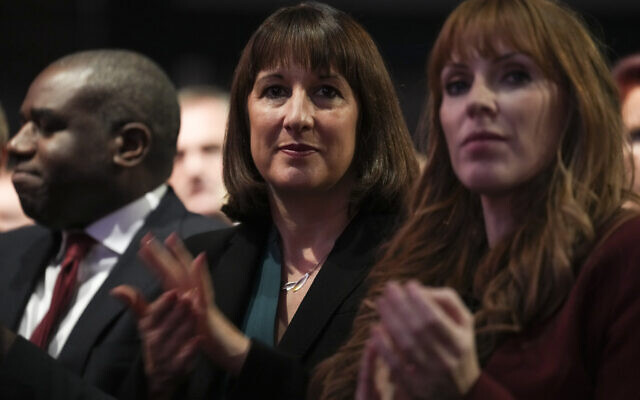
Nonetheless, some argue that Labour’s stance on Israel remains a work in progress.
“The Corbyn years have left large parts of the membership obsessed with and hostile to Israel, singling it out for criticism and holding it to standards they would never apply to other countries, showing there is much more work to do,” Ian Austin, a former Labour MP who now serves as an independent member of the House of Lords and the UK’s trade envoy to Israel, told the Jewish Chronicle.
A senior Jewish community source agrees: “When it comes to Israel, hostility and unfair double standards are still prevalent, but there is far less squeamishness in expressing support for Israel.”
Not quite ‘fait accompli’
Dr. James Vaughan, an expert in UK-Israel relations at the University of Aberystwyth’s department of international politics, likens Starmer’s approach to the efforts of former Labour leader Neil Kinnock to rebuild relations with the British Jewish community when he took office following a previous period of left-wing turbulence in the party in the early 1980s. The community, Vaughan says, “remembered all too well” the hardline, anti-Israel resolutions passed at Labour’s conference in 1982 at the height of the Lebanon war.
“Now, as then, there are those whose trust in Labour has been so comprehensively shattered that they refuse to countenance the possibility of meaningful reform,” Vaughan says. “There has been a significant political and cultural shift at the top of the party but much work remains to be done.”
Vaughan believes there are “ongoing questions about the attitudes within the wider membership.” He cites the election of Naomi Wimborne-Idrissi, a co-founder of the pro-Corbyn Jewish Voice for Labour, to the NEC earlier this year. Wimborne-Idrissi is currently suspended from the party over allegations she spoke at a meeting staged by a proscribed group. (Wimborne-Idrissi has accused Labour of trying to silence Jewish members who are critical of Israel).
Vaughan believes that Starmer’s use of the past tense to describe why Labour had needed to “rip out antisemitism out by its roots” will have “struck some as a rather premature declaration of ‘mission accomplished.’” The change in the leadership culture, he says, is “welcome, but top-down reforms, by definition, don’t address the roots of the problem. The ongoing educational work required to bring about meaningful change at all levels of the party will, I suspect, prove to be a tougher and longer-term challenge.”
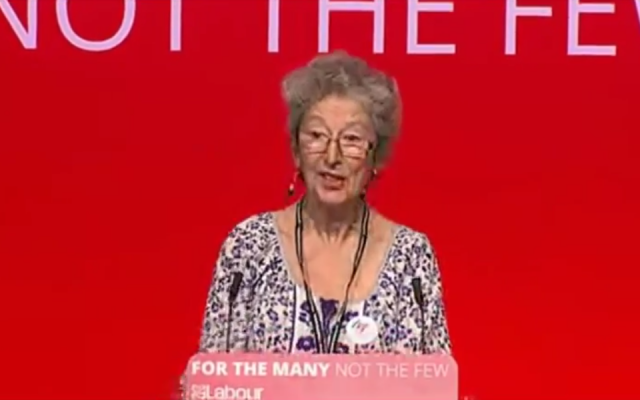
The long shadow of Corbynism may be receding in the Labour party, but the former leader’s far-left politics may have a lasting legacy, believe some observers.
The anti-Zionist political antisemitism which was a prerequisite for Corbyn’s election as leader is still present in the “broad political milieu in which the Labour Party sits,” says Dr. David Hirsh, senior lecturer in sociology at Goldsmiths, University of London, and founder of the newly launched London Center for the Study of Contemporary Antisemitism.
“Zionism [and] Israel,” he warns, are widely seen as symbolic of, and central to, the “global structure of power.”
“The ideas that a Jewish project is key to the whole machine of domination… are widespread and they are antisemitic,” Hirsh adds.
“It is plausible that the majority of Labour members, who never really believed in Corbyn’s antisemitic politics but went along with it anyway, do not now really believe that there ever was a significant problem of Corbynite antisemitism,” he says. “But they have been convinced that if you upset the Jews then you’ll never win a general election — so they know now to say the right things about an antisemitism problem that they never really understood.”
Beyond this, Hirsh cautions, lays a section of society which, in the wake of Labour’s 2019 defeat, believes that “between ‘us’ and ‘progress’ sits the Zionists, willing to stoop to any kind of dishonesty that is necessary to stop them.”
Their view that allegations of antisemitism in the party were simply a scam and a smear aimed at preventing the election of a Corbyn government is “a new form of the old ‘stab in the back myth’ which insists that the left was defeated by a Zionist fifth column that pretended to be part of the left, but that in fact was Tory or Trumpist.”
The antisemitism problem in Britain is worse than it was before the rise of Corbyn
“For this reason alone, the antisemitism problem in Britain is worse than it was before the rise of Corbyn,” Hirsh says.
Hirsh also warns that the problem of anti-Jewish racism is by no means confined to the left. The continuing appeal of populism and the threat of deep economic hardship provide “favorable conditions for the growth of antisemitism and of anti-democratic politics.”
The governing Conservative party has its own “issues with racism, xenophobia… and populist conspiracy fantasies” which are all attractive to antisemitic thinking.
“Right populism tends to ally with left populism against the kind of rational, democratic, liberal politics that undermines antisemitism,” Hirsh says.
Three years after Corbynism suffered a humiliating blow, the hard left and its antisemitic allies have been driven from the Labour Party — a party which, the polls suggest, is on course to form the next British government.
But the demons upon which it thrived — and to which it has, in turn, contributed — are far from vanquished from the UK’s wider political scene.
Robert Philpot is a writer, political speechwriter and journalist. He is a columnist for the Jewish Chronicle, former editor of Progress magazine and author of “Margaret Thatcher: The Honorary Jew.”
There's no paywall on The Times of Israel, but the journalism we do is costly. As an independent news organization, we are in no way influenced by political or business interests. We rely on readers like you to support our fact-based coverage of Israel and the Jewish world. If you appreciate the integrity of this type of journalism, please join the ToI Community.

We’re really pleased that you’ve read X Times of Israel articles in the past month.
That’s why we started the Times of Israel eleven years ago - to provide discerning readers like you with must-read coverage of Israel and the Jewish world.
So now we have a request. Unlike other news outlets, we haven’t put up a paywall. But as the journalism we do is costly, we invite readers for whom The Times of Israel has become important to help support our work by joining The Times of Israel Community.
For as little as $6 a month you can help support our quality journalism while enjoying The Times of Israel AD-FREE, as well as accessing exclusive content available only to Times of Israel Community members.
Thank you,
David Horovitz, Founding Editor of The Times of Israel









